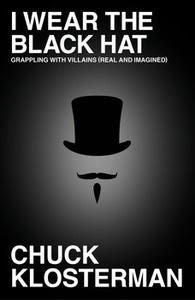Take a photo of a barcode or cover
Generally speaking, I could probably read Chuck Klosterman talk about random pages in the phone book these days, but I Wear the Black Hat is a shortish book of essays about villains in the world and in fiction, and I'm more than okay with that.
The book works best because Klosterman knows that bad guys (or possible bad guys) are always more interesting. So we get topics like OJ Simpson, and Hitler next to Bernie Goetz and Andrew Dice Clay. The essays are short enough to be quick, easy reads, and Klosterman's style is fairly straightforward, so everything lines up together. Plus, it's really the perfect length - by the time it starts to feel a little tiring, it's done and over with.
Very well done. If you're interested in intersections between culture and villainy, or just think Klosterman is awesome, this is absolutely solid.
The book works best because Klosterman knows that bad guys (or possible bad guys) are always more interesting. So we get topics like OJ Simpson, and Hitler next to Bernie Goetz and Andrew Dice Clay. The essays are short enough to be quick, easy reads, and Klosterman's style is fairly straightforward, so everything lines up together. Plus, it's really the perfect length - by the time it starts to feel a little tiring, it's done and over with.
Very well done. If you're interested in intersections between culture and villainy, or just think Klosterman is awesome, this is absolutely solid.
I received an ARC from Simon and Schuster at work and I was super excited. Eating the dinosaur has been on another level entirely and I wondered where this one would land amongst Klosterman's nonfiction. While i like the concept and the more cohesive, central theme, it comes across slightly rambly at times and becomes sort of one long essay, whereas Klosterman excels at the shorter essay collections. It seems as if it was meant to be a book about one thing, but that fails to either be clearly about one thing or about a group of things falling into a certain category.
In the end, while entertaining, this comes across almost as a really long thought exercise, not a publishable book.
In the end, while entertaining, this comes across almost as a really long thought exercise, not a publishable book.
This review is for the audiobook only.
This audiobook is unlistenable to me. The book is read by the author who has a horrible voice and a really annoying cadence.
This book is not for me.
This audiobook is unlistenable to me. The book is read by the author who has a horrible voice and a really annoying cadence.
This book is not for me.
Klosterman had a good idea in this book, but it gets lost in dubious long discussions of trivial music and sports "villains."
As usual Klosterman messes with my head with this book. He questions the entire thought process behind labeling someone a "villain". Starting with The Eagles and reaching all the way to Hitler, he discusses our definitions and the public's desire to demonize people. The concept that villains are those who know but don't care doesn't completely settle well with me but I was fascinated by the comparisons Klosterman draws between similar people (i.e. Hitler vs Mao/Stalin). Since I'm still digesting this book, instead of really getting into my review, I thought I'd share the texts that I sent while reading it:
-Why DO we differentiate between D.B. Cooper and the 9/11 terrorists? Is it because there are no deaths? Cooper wasn't responsible for any deaths but he did threaten violence.
-Why do we demonize HRC and Lewinsky? I'm not comfortable saying WJC is a villain though. I love him.
-I think I'm a villain.
-I do love that people use Machiavelli but don't know anything about him. He's become a cultural phrase.
-Klosterman uses words like "antediluvian" and I bet he even knows it means. I do not nor do I need to. I don't think.
-I like how The Eagles and the Hitler chapters are less about the people themselves and more about our reactions to them.
-Why DO we differentiate between D.B. Cooper and the 9/11 terrorists? Is it because there are no deaths? Cooper wasn't responsible for any deaths but he did threaten violence.
-Why do we demonize HRC and Lewinsky? I'm not comfortable saying WJC is a villain though. I love him.
-I think I'm a villain.
-I do love that people use Machiavelli but don't know anything about him. He's become a cultural phrase.
-Klosterman uses words like "antediluvian" and I bet he even knows it means. I do not nor do I need to. I don't think.
-I like how The Eagles and the Hitler chapters are less about the people themselves and more about our reactions to them.
Thought-provoking, sharp, brilliant. Klosterman is back and in top form. Occasionally (rarely), one feels that a book, movie or piece of art was made for them: This is my book.
I read this book due to it's place on Amazon's "Best Books" list. It is advertised as a thoughtful exploration of our perceptions of villains (which it is) and humorous (not so much). Some of the sections were quite interesting, detailing multiple people I was unfamiliar with, while exploring well known examples to modern readers including O.J. Certain sections though I wish I had skipped, such as his analysis of all the bands he hated for over a decade. This book is good, but is not a must read and wouldn't be my top recommendation if you can only read one book during a break/holiday.
I enjoy Klosterman tremendously but he's not as good here as when he writes on music. But really my biggest complaint is that it feels half-baked. The book is over before it really gets going.
It was OK. All essays about villains and why they're considered villains.
dark
funny
informative
reflective
medium-paced






